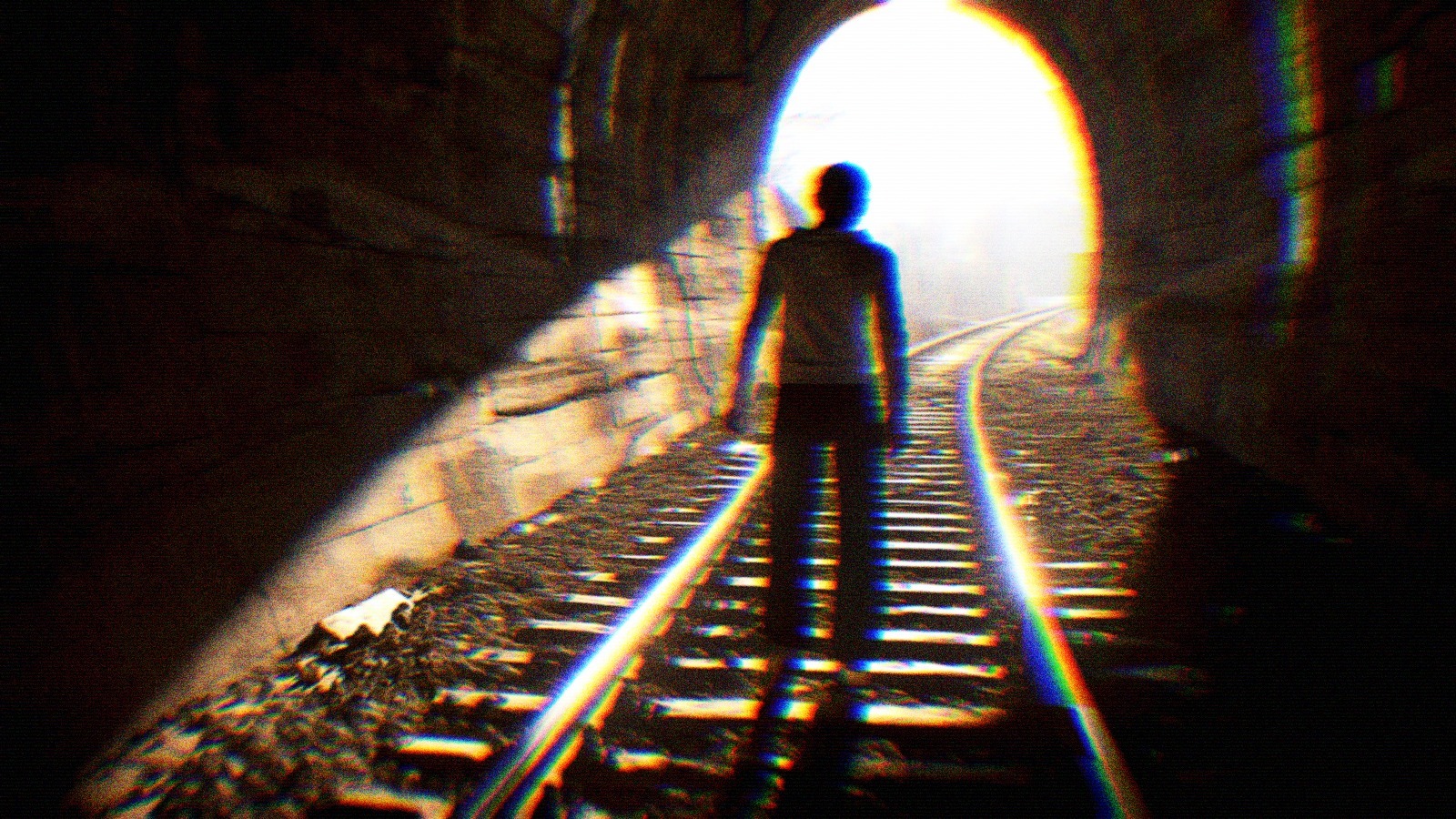The End of Capitalism.
A Journey Into the Unknown.
 Image Description: A person approaching the end of a tunnel, unsure of what lies on the other side.
Image Description: A person approaching the end of a tunnel, unsure of what lies on the other side.
Is this the end of Capitalism? If so, what comes next? Does it even matter what we call it? Today Max pauses to reflect on the speed and totality of damage wrought by the Trump administration, and whether it’s bringing about the end of Capitalism on purpose in order to return to a state reminiscent of the industrial era when the working class lived to serve the elite and the poor thrown to the streets.
We are entering a new phase of empire and with it, we are ushering in a new world order, a new global economic order and moment of truth for the planet. Some are clear eyed in the moment, even in the midst of the hurricane. Others, not so much.
There are two constituencies among this group. Those who hold out hope that our institutions will hold and this too shall pass. These are people who possess a level of resignation but acknowledge this is happening and it will take years if not decades to rebuild. The other exists in the denial camp. They inhale the news of the day and try to make sense of it all. Some offer excuses and mitigations.
“We were due for a recession.”
“He’ll listen to the markets ultimately.”
“I wish he used a scalpel but at least he’s doing something. Government waste is a problem.”
The logic among both camps is built on a fundamental misreading of the circumstances and a belief that at the end of the day, no one wants to see the United States collapse. (No one inside the United States at least.) Half think Trump is ruthlessly inept but that the system will hold. The other may think he’s inept, but is slightly optimistic that he’s onto something. After all, the sky didn’t fall after the first term.
Right? Right?
This is the endgame for capitalism my friends. We’re entering something entirely new, unless there is a mass awakening to a singular reality: They’re doing this on purpose.
What Comes Next?
There are several competing narratives on the left about the moment we find ourselves in capitalism’s history. Yanis Varoufakis describes the dawn of a new era he terms Technofeudalism; a global economic system whereby tech oligarchs control our increasingly digital lives through ownership of what he calls cloud capital; entire lives reduced to keystrokes, bits and bytes. Jodi Dean calls what we’re entering “neofeudalism.“ Bernie Sanders and AOC are touring the country on the “Fighting Oligarchy” tour. We’ve referred to it as Corporate Colonialism, a concept first proposed by Stanley Deetz, where corporations exert a form of “colonial“ control by embedding their values, priorities, and decision-making processes into the social and political fabric, often at the expense of democratic ideals and the public good.
Technofeudalism. Oligarchy. Neofeudalism. Corporate Colonialism. All slight variations on a theme that reflect worst case scenario outcomes marking the end of capitalism. Thomas Piketty’s work revealed how the wealthiest people on the planet compound their gains over time relative to the rest of the world. He rightly pointed out, with actual data—which is why his work is so important, it took us beyond the anecdotal—that rising inequality will lead to mass migration, widespread misery, and worsening poverty.
Proponents of capitalism point to longevity. Inhabitants of the industrialized world live longer than they did 100 years ago. Technology has led to abundance and comfort. Had capitalism not taken over the world, we would be living in some dystopian Soviet nightmare where bureaucrats disappear people from the streets, masses live in squalor and the state apparatus controls all the information and restricts our freedoms.
Reconciling these two beliefs is impossible in our media-driven culture. And arguing about them only serves to distract us from the theft occurring under our noses. We’ve argued these points from all sides. Offered theories and theorists, doctrines and ideologies, and opined over systems and outcomes for years on UNFTR. For example, we’ve demonstrated repeatedly how the innovations that the donor class point to as triumphs of capitalism are all rooted in government programs and bureaucratic design.
Every time capitalism delivers a blow to the middle and lower classes, government intervenes to brush off the dust and get them back on their feet. Only to fall into the same cycle over and over again. The so-called free market doesn’t intervene to lessen the devastation and rebuild. We’ve never even had a free market so it’s folly to argue about it. So again, these are the big picture discussions we have to have.
Boom and Bust
We need to make the distinction between economic and political systems. Capitalism is not a complete operating system. If you want to say that a global market economy is an operating system, that’s one thing. But I think people conflate these. At its core, capitalism is a way of organizing ownership of capital. It’s a predetermination of who owns the investment capital and who retains the surplus value of a good or a service, aka who gets the profit. Individuals? Corporations? Governments? There are a million caveats and nuances along the way but that’s the essence of what capitalism attempts to sort out.
In the United States, we ascribe a certain omnipotence to capitalism in that we have determined nearly every aspect of our republic will serve the interests of capital. To wit, our legal code exists to primarily clarify and preserve property rights. We will levy surcharges on the population to fund projects that facilitate the flow of capital and goods and provide a common defense of the nation to ensure our systems function freely and safely. Of course there are personal liberties and protections that are enumerated in the Constitution but the vast majority of the legal code in this country—and our client state partners abroad by extension—serve the interests of the capital holder.
To paraphrase Hyman Roth, this is the system we have chosen. Rather than argue the upsides and downsides, there is one thing more to understand about market systems and capitalism. Market systems under capitalism are designed to fluctuate in boom and bust cycles. If we are, as pretty much everyone acknowledges, entering a recession right now then know that it is indeed right on time.
This will be the fifth recession of my adult working life. I came into the working world in the early ‘90s recession. Then came the dot-com bubble burst followed by the financial crisis. Then COVID. Each one was triggered by something different, but the trigger is beside the point. A modern capitalist market cycle is just that. A cycle. There’s a low point, a middle point and a high point. Then it resets and starts again. As we’ve said many times, a recession is a feature not a bug. It’s how we decide to respond in these times that determines the level of pain among the disparate classes.
The poorest among us will always suffer the most followed by the working poor. Our system typically intervenes for short periods to limit the damage but the damage is still pretty severe. The working class and middle class can potentially fall into temporary hardship and it can take years to climb back into the middle class. But extended family members, government support and education usually blunts the impact to a degree. The upper middle class might lose long-term savings and security and is forced to reboot and reset expectations, but they make it through. But the wealthy keep on keeping on.
That’s where we find ourselves in this century and why there are philosophers and intellectuals raising the red flag and warning that we’re heading for something new. Since the turn of the century, the pain has deepened and been more widespread. Tax revenues as a percentage of the economy are shrinking, leading to widening inequality. This capital capture has allowed the top one percent to do what everyone from Piketty back to Marx feared. They’ve taken control of the legal and governmental apparatus and are rewriting the rules to allow them to accumulate even more wealth.
Look at the DOGE cuts. Elon Musk’s team said they cut $150 billion from the government budget of $7 trillion. Even if that were true, which it’s not, that’s nothing. But of the amount that is true, it came from poverty programs and the mass liquidation of federal employees.
Every bust cycle since George W. Bush has required massive government intervention. And it gets bigger every time. They use fancy words like stimulus and quantitative easing. It’s government intervention to prevent whole pockets of the lower and working class from living on the streets or dying. Do you really think this administration is prepared to do the same? Because we’re heading into a recession. This is happening. But for the first time, we’re going in with a weak dollar, high interest rates and high inflation while eliminating benefits and social safety nets. The only other time in our history that we did this was the 1920s.
Revisiting Riis
I recently admonished readers to “read their Dickens” as famed British trader-turned-influencer and economist Gary Stevenson has often said. For Americans I appended this sentiment with a call to read Jacob Riis’ How the Other Half Lives. I hadn’t read Riis or looked at his famous NYC tenement photographs since college so I decided to “eat my own dogfood” as they say.
On a recent trip to visit our eldest, we spent time in one of my favorite bookstores. As if by providence, the book was prominently displayed and one of the first to catch my eye. Funny how hive minds work. A book from 1890 finding its way back into the left consciousness and onto the store shelves in 2025. The overtly racial language can be halting to modern sensibilities but the text still resonates clearly.
This was capitalism’s shining era in the United States. It was also one of humanity’s worst.
This is the period the oligarchs are desperate to reclaim. Don’t take my word for it. From the Koch Brothers to Milton Friedman to the authors of Project 2025. The industrial age in America is their North Star. They wrote about it constantly.
They look back fondly upon the days before regulations and worker protections. When children toiled in factories and desperate parents took out life insurance on their heads. This was a real thing. If one of your kids dies in a factory at least you can collect a few bucks. Life in the summer months was lived above the skyline as rooftops were the only safe harbor from the sweltering heat and stench of the windowless rooms below. There was a hierarchy of poor people. The working poor. The disabled. The paupers. The beggars. Many ended their brief time on this earth in unmarked holes in Potter’s Field.
But, oh! The glory of capitalism. Fortunes could be made through theft and courts and policemen could be purchased with the ill gotten gains. There were no formal rules, only the rules of the jungle. Moving between classes was strictly prohibited, unless a service was to be rendered through indentured servitude. When sociologists refer to the creation of a middle class as a grand achievement in history, it truly was.
The oligarchs in charge of the country right now are okay with decimating the economic class that took 125 years to build. And yet the optimism among their followers and detractors remains. Surely they won’t burn it all down. The global economy is built on the U.S. consumer. How many times have we heard that? But let me ask you something? Who are we talking about? The single mom living paycheck to paycheck to pay rent and buy food? Is she really holding the global economy together?
Today, the top 10% of household income earners, defined as $250,000 and above, is responsible for half of all consumer spending. So when economists talk about the global economy resting on the back of the U.S. consumer, that’s who they’re talking about. The gains at the top of the economic spectrum have been so monumental that they can continue to thrive even if everything falls apart around them. Gated communities. Armed guards. Private healthcare. Clean water. Breathable air. This will all still be available just as it was during the time of Riis and Dickens; the lower classes existing to serve the elite. Just like they planned. Just as it was.
If you die younger, they can handle that. If you spend what time you have living in squalor, they can handle that as well. Education system torn to pieces? Okay. The bridges and roads leading to towns across America might fall apart but the golf courses will be pristine.
There are some that have faith that the Trump administration knows what it’s doing. That we just need to give it time. And I’m one of them. I know exactly what they’re doing.
So, yeah. Maybe this is the beginning of a new feudal era. Maybe everything will look like Bladerunner. Is this the end of capitalism? Does it matter what we call it?
Diagnosing the problem is easy but not obvious. But the path forward is a bit more obvious once you concede that the elite are building a moat and are prepared to separate us and kill off the poorest among us. I really believe that. And it’s why I’m more animated than ever before.
We have two wars to win. The civil war in the democratic party where we work to overthrow the Democratic Establishment, because they think that if we just bide our time the democratic process will put them back in power. To do what? Slow the inevitable? The problem with them is that they think the government is still in charge. Trump has defied the courts as a citizen and now as President. He’s defied Congress. He cleared the pieces off the board. Simply putting them back in place cannot fix everything.
Whether you’re a capitalist or a socialist you should be against feudalism, oligarchy, Technofeudalism or whatever. Leftist philosophers have always believed that capitalism’s end would usher in a socialist state. Capital’s interests might be too entrenched. Knowing that they’re willing to build the moat and live in the castle means they can keep this up much longer than we can.
If a socialist paradigm is unattainable then we need to beat them at their own game and build something that resembles a grander vision by taking back control of the system before it’s too late. The only group that has the apparatus we need to do this is the Democratic Party so that’s where it starts. The Party today lacks vision and courage. So much so they’re essentially complicit. We need to build left coalitions that speak clearly and uniformly to demand Medicare for All, the guaranteed right to meaningful work and housing as a human right so we can work to get money out of politics and center the climate in all policies moving forward.
Those are the policies and topics we’ve committed to but hopefully it makes more sense now as to why I believe this is the moment. Either we seize it or we cede it. There’s no middle ground.
Here endeth the lesson.
Max is a political commentator and essayist who focuses on the intersection of American socioeconomic theory and politics in the modern era. He is the publisher of UNFTR Media and host of the popular Unf*cking the Republic® podcast and YouTube channel. Prior to founding UNFTR, Max spent fifteen years as a publisher and columnist in the alternative newsweekly industry and a decade in terrestrial radio. Max is also a regular contributor to the MeidasTouch Network where he covers the U.S. economy.


